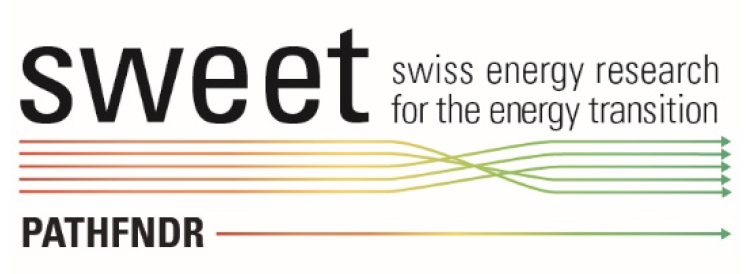Projects
|
Ongoing projects
|
|
|
|
Funded by the highly competitive Swiss National Science Foundation Eccellenza Grant, the project "Accuracy of long-range national energy projections" (2021 – 2026) aims to position accuracy at the forefront of the evaluation, improvement, and visualization of long-range national energy projections and models for energy and climate policy. This high-risk high-gain project challenges the common assumption that accuracy cannot be improved when modeling long-range phenomenon with a strong human component. First, using extensive retrospective and prospective modeling in 31 European countries, the project will collect first-of-the-kind generalizable empirical evidence in order to define new accuracy benchmarks for long-range national energy projections. Second, the project will deliver novel concepts, modeling tools, and data for the wider energy modeling community to achieve these new benchmarks. Third, various visualization formats of the projections will be evaluated with the intended users to find visualizations that best facilitate decision making. The ultimate ambition is to achieve an in-principle change in how accuracy is viewed in long-range energy foresight. |
|
|
|
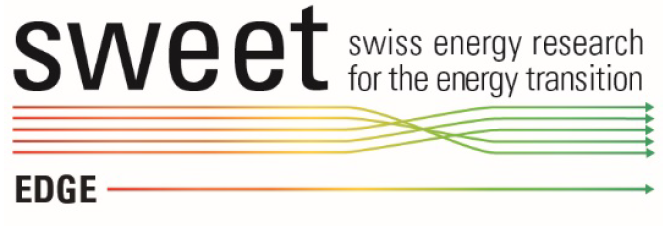 |
The SWEET-EDGE consortium "Enabling decentralized renewable generation in the Swiss cities, midlands, and the Alps" (2021 – 2027) aims to fast-track the growth of locally-sourced decentralized renewable energy in Switzerland and to ensure that by 2035 and 2050, when ambitious shares of renewable energy are reached, the Swiss energy system is designed and operated in a technically and economically optimal as well as secure way, and that it is well positioned in the European markets. Specifically, the EDGE consortium aims to move beyond generic designs of decentralized renewable systems and markets to a regionalized analysis that is tailored to the Swiss cities, midlands, and the Alps. The consortium plans to combine research with innovation from three clusters of Pilot and Demonstration project (P&Ds) in urban settings (the cantons of Bern, Luzern, and Aargau), midlands (Waldkirch, St. Gallen), and the Alps (Davos and Bagnes-Verbier, Graubünden and Wallis). With overall costs of 22.3 mln CHF, SWEET-EDGE involves 16 research partners (energy technology, systems modeling, political science, management, economics, and sustainability science), 20 implementation partners, and over 40 other supporting partners from industry and public authorities. SWEET-EDGE is jointly led by Prof. Evelina Trutnevyte and EPFL Prof. Michael Lehning. |
|
|
|
|
|
The SWEET-PATHFNDR consortium "PATHways to an Efficient Future Energy System through Flexibility aND SectoR Coupling" (2021 – 2027), led by ETH Zurich, aims to address the challenge of how to incorporate a higher share of renewable energy sources in the Swiss energy system, especially focusing on the role of flexibility and sector coupling. The project aims to investigate: (1) What will an efficient, flexible, resilient, cost-competitive, and sustainable Swiss energy system by 2050 look like? (2) What legislative and regulatory frameworks should be adopted to enable the transition to this system? (3) Which business models and commercial value propositions should be developed to value needed flexibility and sector coupling? (4) What measures are necessary to ensure acceptance and participation of citizens and their organizations? (5) How can pilot and demonstration projects of flexible energy systems at the district, village, and city scales be best exploited to trigger wider adoption? UNIGE Renewable Energy Systems group contributes with high-resolution spatial energy systems modeling and, in collaboration with UNIGE Prof. Tobias Brosch, with an analysis of how and why the opinions of Swiss citizens about net-zero emissions energy system evolve with more information. |
|
|
|
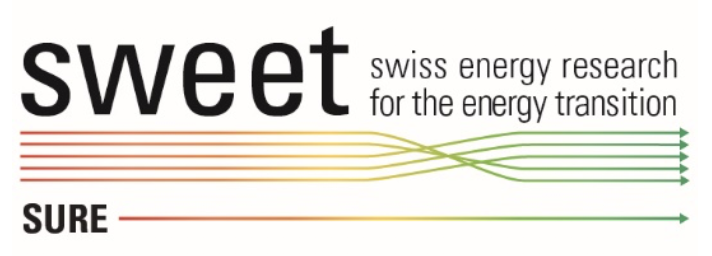 |
The SWEET-SURE consortium "Sustainable and resilient energy for Switzerland" (2021 – 2027), led by Paul Scherrer Institute, addresses the need for an integrated assessment of sustainability and resilience in Switzerland, analyzing the multiple dimensions of environment, use of natural resources, public health, economics, security of supply, and social well-being. A novel quantitative model- and data-based framework will be developed and applied based on combining holistic systemic approaches, comprehensive indicator databases, energy infrastructure and system modeling, and explicitly representing social and policy aspects. Focusing on Swiss national developments as well as selected regional case studies, resilience will be analysed with a long-term perspective (2035 and 2050) as well as future disruptive events (using shock scenarios with disruptions at different scales). The results will feed into a stakeholder-informed, multi-objective decision analysis to develop strategies and policy measures to design an energy system that is more sustainable and robust against disruptions. UNIGE Renewable Energy Systems group contributes to SWEET-SURE with the modeling of disruptive future scenarios of fast uptake of solar PV, heat pumps, and power-to-x technologies, including the socio-technical feasibility and resilience impacts of these scenarios |
|
|
|
|
|
The Horizon Europe project PRISMA (2022-2026) aims to bring integrated assessment models of climate change and sectoral models to the next level by focusing on four key areas of improvement, namely the representation of distributional justice and efficiency, innovation and finance, climate impacts and land-use implications, and lifestyle change and circularity. Two cross-cutting shared themes across these areas are the improvement of the temporal and spatial resolution of the analysis, and the representation of disruptive and structural change in the economy. The extensive model development will be co-designed through an interactive stakeholder engagement process from the beginning, and focus on model openness and usability to ensure the stakeholder and policy relevance. UNIGE Renewable Energy Systems group contributes to PRISMA with electricity sector modeling for Europe at a high spatial and temporal resolution and with integration of citizen preferences in model-based scenarios. |
|
|
The Horizon Europe project IAM COMPACT (2022-2025) supports the assessment of global climate goals, progress, and feasibility space, as well as the design of the next round of Nationally Determined Contributions (NDCs) and policy planning beyond 2030 for major emitters and non-high-income countries. The project uses a diverse ensemble of models, tools, and insights from social and political sciences and operations research, and integrates bodies of knowledge to co-create the research process and enhance transparency, robustness, and policy relevance. UNIGE Renewable Energy Systems group contributes to IAM COMPACT with electricity sector modeling for Europe at a high spatial and temporal resolution and with modeling of disruptive innovation. |
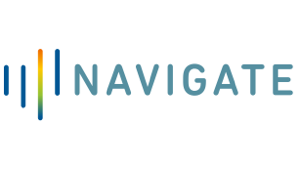 |
The H2020 project NAVIGATE “Next generation of AdVanced InteGrated Assessment modelling to support climaTE policy making” (2019 – 2023) aims to critically improve the capability of Integrated Assessment Models to inform the design and evaluation of climate policies by targeting major advancements in two areas: describing transformative change in the economy, in technology and in consumer goods and services, and describing distributional impacts of climate change and climate policy. By tackling existing weaknesses and lack of capabilities of current Integrated Assessment Models, NAVIGATE will provide new insight into how long-term climate goals can translate into short-term policy action, and how countries and sectors can work in concert to implement the Paris Agreement. |
|
|
|
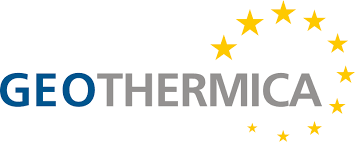 |
ERA-NET Geothermica project “Innovation for De-risking Enhanced Geothermal Energy projects (DEEP)” (2020-2023) brings together an interdisciplinary team of scientists and practitioners from around the World to work on seismic risk governance for deep geothermal projects for electricity production. This project covers recent advances in seismic monitoring technologies, seismic modeling and process understanding, as well as risk-cost-benefit analysis, regulation, and risk communication. DEEP executes a work program that leverages on national efforts, bringing ongoing and planned, but currently fragmented, initiatives together into a coherent international effort towards the ultimate goal of de-risking future geothermal projects worldwide.
|
|
|
|
 |
In collaboration with Prof. Marlyne Sahakian from the Department of Sociology at the University of Geneva, this project (2018 – 2022) of the Institute for Environmental Sciences investigates the spatial patterns in renewable energy diffusion in Switzerland by combining socio-technical transitions theory and spatial energy modeling. The aim is to conduct a retrospective descriptive analysis of how renewable energy projects have diffused in Switzerland since 2008 and to conceptualize this diffusion using the so-called multi-level perspective to transitions.
|
|
|
|
|
Finished projects
|
|
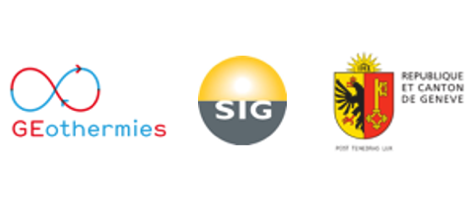 |
In the frame of GEothermies program led by Services Industriels de Genève and the State of Geneva, this project (2020 – 2021) focuses on designing robust planning options for integrating shallow geothermal heat in the municipality of Versoix. The analysis is based on evaluating energy and economic performance of future planning options, across uncertain socio-technical conditions and subsurface properties. The project uses a coupled simulation architecture, combining Geographic Information Systems, agent-based simulation of shallow geothermal heat and related infrastructures, and a subsurface model. |
 |
In the frame of GEothermies program led by Services Industriels de Genève and the State of Geneva, the Renewable Energy Systems group in 2019 – 2022 investigates life-cycle environmental, economic and employment impacts of various heating and cooling alternatives in Geneva. The project in particular aims to fill the knowledge gaps on shallow and medium-depth geothermal systems and then to conduct an integrated environmental-economic assessment of the full heating and cooling mix in one of Geneva’s districts. |
 |
This highly competitive Swiss National Science Foundation Ambizione Energy project RIGOROuS "RIsk GOveRnance of electricity pOrtfolioS: Cross-technology and spatial tradeoffs of multiple risks" (2015 – 2018) investigates the negative impacts and risks to human health, safety, natural and built environment, posed by the Swiss electricity portfolio as a whole. Multiple impacts and risks associated with the electricity generation technologies are mapped out first, taking a broad and open view to known and uncertain consequences, known and uncertain likelihoods, and varying knowledge confidence. This information is then made accessible using a web-based interactive tool RISKMETER (basic and spatially-explicit versions). RISKMETER is ultimately used in surveys and deliberative workshops for measuring expert, stakeholder and public preferences for the Swiss electricity portfolio. |
|
|
|
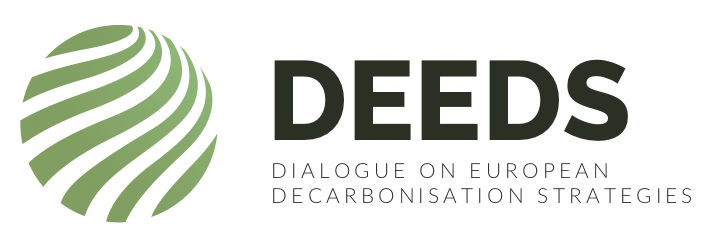 |
The Horizon 2020 project DEEDS "Dialogue on European Decarbonisation Strategies" (2017 – 2020) supports the European Union Directorate-General for Research and Innovation and the High-Level Panel of the European Decarbonisation Pathway Initiative (EDPI) with state-of-the-art knowledge on decarbonisation pathways for Europe and through facilitating knowledge co-creation with policy, business representatives, scientists, NGOs and other stakeholders. The High-Level Panel consists of leaders from research, business, NGOs and public bodies and steers the implementation of the EDPI, through the provision of independent strategic advice. As the High-Level Panel has no research capacity of itself, the DEEDS project delivers the expertise of leading European research organizations on low-carbon transition pathways. |
|
|
|
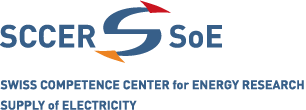 |
The Swiss Competence Center for Energy Research - Supply of Electricity, or so-called SCCER-SoE (2014 – 2020), carries out coordinated, innovative research in the areas of geo-energy and hydropower in Switzerland. As a national network, the SCCER-SoE brings together the expertise from 30 Swiss scientific institutions, industrial enterprises, and federal agencies. UNIGE Renewable Energy Systems group is part of the SCCER-SoE Task on risk, safety and societal acceptance with the focus on deep geothermal systems, as well as the joint activity task on scenarios and modeling. |

